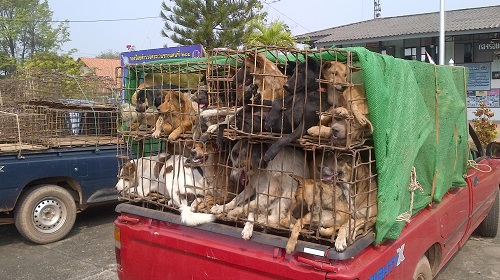Last week the backbencher debate in the British House of Commons on Asia’s dog meat trade highlighted the levels of cruelty to dogs involved in the industry, and the extreme human health risks associated with eating dog meat, said Soi Dog Foundation.
Rob Flello MP told of dogs “housed and transported in disgusting conditions in which they can often barely move, and killed in the most excruciatingly cruel and painful ways”. He added “It is common for the animal to be bludgeoned, hanged or electrocuted, and, in some cases, for the animal to be thrown fully conscious into a drum of boiling water—anything that ensures maximum suffering”.
Inflicting maximum pain on a dog before it dies creates adrenalin that is thought by some in Asia to tenderise the meat.
Gavin Robinson MP weighed in by describing the Asian dog meat trade as “international barbarism”.
The scale of the industry is alarming. Around 20 million dogs are killed and eaten each year in China, five million in Vietnam, two million in South Korea, with Indonesia also serving up dog meat dishes. Whilst countries like Thailand and the Philippines have officially banned the sale and consumption of dog meat, the trade still continues underground.
Aside from animal welfare issues, the debate also revealed serious human health hazards associated with eating dog meat. Parliamentary Under-Secretary of State for Foreign and Commonwealth Affairs, James Duddridge MP said “So unregulated is the dog meat trade industry, that there is a huge risk to human beings from diseases such as cholera and rabies, with the latter found to be present in slaughterhouses and markets in China, Vietnam and Indonesia”.
Alex Cunningham MP also referred to statistics stating evidence of a 20-fold increase in the incidence of rabies amongst people who had consumed dog meat across the Asian region.
Hanna Bardell MP also raised concerns about dog meat entering the UK food chain, asking “Do the Governments of our nations have a role to play in terms of the security of the supply chain and making sure that none of this dog meat enters our food chain and threatens our food supply?”
The British government however is wary of preaching western ideals to eastern countries. Robert Flello MP added: “I do not believe that it is generally this House’s role to tell societies abroad what they should or should not do based on western sensibilities, but we cannot allow tradition to be used as a smokescreen for practices that are barbaric, cruel, inhumane and disgusting”.
Steve Reed MP agreed, saying “There is a role to be played in seeking to secure global standards of animal welfare and in working with local campaign groups on the ground in the countries affected to help them strengthen their own cases”.
Conclusion to the Debate
As a result of the debate, MP James Duddridge made two commitments on behalf of the government; to write to all British Ambassadors in the countries concerned to review what they are doing in relation to the dog meat trade, and to consider a review of how the government interacts on this issue with the various international organisations (for example, the World Health Organisation), specifically on the area of health.
Enter your email and never miss out on receiving our best articles:




